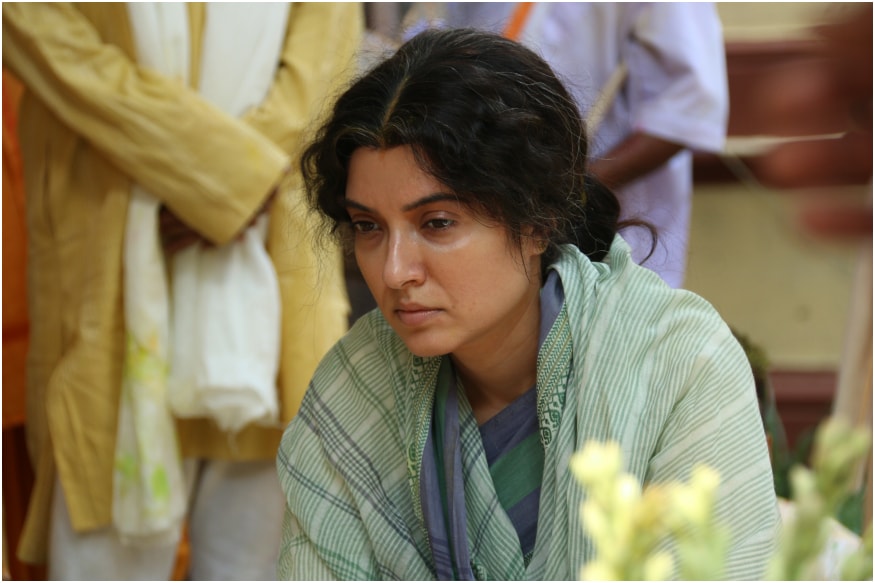At IFFI 2018, Abayakto, Unsaid and Understated Bengali Creation
One has watched several movies touching upon the relationship between a father and son. But I do not remember – at least in the past several years – one that speaks about a mother and her son.

A still from Abayakto
Loading...
One has watched several movies touching upon the relationship between a father and son. But I do not remember – at least in the past several years – one that speaks about a mother and her son. Arjun Dutt's debut feature, Abayakto (Unsaid), which played at the recent Kolkata International Film Festival and will also screen at the ongoing International Film Festival of India (IFFI) in Panaji, is moving story of a son who moves away from his mother, the estrangement worsening after the death of his father.
It is Abayakto's narrative simplicity which catapults it to memorable heights, and when I watched Dutt's creation at Kolkata's Nandan Theatre, which was packed beyond belief with men and women filling up every inch of space (the aisles and steps included), my respect for Bengali cinema grew. Bengal, the land of Renaissance where men like Tagore and Ray and Ghatak left behind a great cultural tradition, could still tear itself away from the overwhelming influence of Bollywood. Abayakto is a case in point at a time when Mumbai's movie mughuls have been almost casting a spell on Bengali movies.
Honestly, in under 90 minutes, Dutt gives us a mind-blowing work. it is intelligently conceived, imaginatively narrated and admirably performed. The frames look uncluttered, neatly composed and so disarmingly simple that the film moves seamlessly from point to point. There is not a minute when it seems a drag, and the story penned by Dutt himself, is entirely believable.
The movie begins with a dream – of a young boy who gets lost during a crowded Holi celebration. It is a dream that haunts Indra (Anubhav Kanjilal) and refuses to leave him even after he has grown into a young man and has a live-in girlfriend, Aditi (Kheya Chattapadhay). Somewhere deep down in the crevices of his memory, he holds his mother, Sathi (Arpita Chatterjee), responsible for having abandoned him as a child. Which she never did, but the young Indra imagines this, and creates a demon of it in his head.
There are other factors which disturb him and take him far away from his mother, even as she leads a lonely life after the death of her husband, Kaushik (Anirban Ghosh). One of them is Sathi's almost desperate efforts to wean Indra away from Kaushik's friend, Rudra (Adil Hussain). And why does she do this? I would rather not reveal this, for this will be a spoiler
In what is an interesting characterisation, Dutta weaves into the script, Aditi, a college lecturer, who goes out of her way to push him to patch up with his mother. If she is subtle, so is Indra in a role where he could have easily gone overboard. Hussain essaying a soft and genteel character – one whom Sathi virtually hates – is marvellous. He is a man wronged, and he conveys the pain and pathos of all this with brilliant ease. The scene between him and Indra towards the end of the movie is compelling written.
With soothing classical music in the background and a camera (handled by Supratim Bhol), which pauses and ponders (and allows the viewer the luxury to stop and stare as well), Dutta presents a film that has all the right notes. But yes, he did not call cut when he should have, the additional few minutes at the climax robbed Abayakto of enjoying the last punch.
(Author, commentator and movie critic covered the recent 24th edition of the Kolkata International Film Festival)
It is Abayakto's narrative simplicity which catapults it to memorable heights, and when I watched Dutt's creation at Kolkata's Nandan Theatre, which was packed beyond belief with men and women filling up every inch of space (the aisles and steps included), my respect for Bengali cinema grew. Bengal, the land of Renaissance where men like Tagore and Ray and Ghatak left behind a great cultural tradition, could still tear itself away from the overwhelming influence of Bollywood. Abayakto is a case in point at a time when Mumbai's movie mughuls have been almost casting a spell on Bengali movies.
Honestly, in under 90 minutes, Dutt gives us a mind-blowing work. it is intelligently conceived, imaginatively narrated and admirably performed. The frames look uncluttered, neatly composed and so disarmingly simple that the film moves seamlessly from point to point. There is not a minute when it seems a drag, and the story penned by Dutt himself, is entirely believable.
The movie begins with a dream – of a young boy who gets lost during a crowded Holi celebration. It is a dream that haunts Indra (Anubhav Kanjilal) and refuses to leave him even after he has grown into a young man and has a live-in girlfriend, Aditi (Kheya Chattapadhay). Somewhere deep down in the crevices of his memory, he holds his mother, Sathi (Arpita Chatterjee), responsible for having abandoned him as a child. Which she never did, but the young Indra imagines this, and creates a demon of it in his head.
There are other factors which disturb him and take him far away from his mother, even as she leads a lonely life after the death of her husband, Kaushik (Anirban Ghosh). One of them is Sathi's almost desperate efforts to wean Indra away from Kaushik's friend, Rudra (Adil Hussain). And why does she do this? I would rather not reveal this, for this will be a spoiler
In what is an interesting characterisation, Dutta weaves into the script, Aditi, a college lecturer, who goes out of her way to push him to patch up with his mother. If she is subtle, so is Indra in a role where he could have easily gone overboard. Hussain essaying a soft and genteel character – one whom Sathi virtually hates – is marvellous. He is a man wronged, and he conveys the pain and pathos of all this with brilliant ease. The scene between him and Indra towards the end of the movie is compelling written.
With soothing classical music in the background and a camera (handled by Supratim Bhol), which pauses and ponders (and allows the viewer the luxury to stop and stare as well), Dutta presents a film that has all the right notes. But yes, he did not call cut when he should have, the additional few minutes at the climax robbed Abayakto of enjoying the last punch.
(Author, commentator and movie critic covered the recent 24th edition of the Kolkata International Film Festival)
Loading...
Next Story Next Story
Also Watch
Also Watch
 Popcorn With Smoke, Pizza Dosa And Quirky Food Experiments At Horn Ok Please
Popcorn With Smoke, Pizza Dosa And Quirky Food Experiments At Horn Ok Please
 Friday 16 November , 2018
Pihu Movie Review | You Don’t Want It To End As A Tragedy
Friday 16 November , 2018
Pihu Movie Review | You Don’t Want It To End As A Tragedy
 Tuesday 20 November , 2018
Exhibitors Demand Refund From Aamir Khan's Movie
Tuesday 20 November , 2018
Exhibitors Demand Refund From Aamir Khan's Movie
 Friday 02 November , 2018
Watch: Diwali Fright For Furry Friends
Friday 02 November , 2018
Watch: Diwali Fright For Furry Friends
 Tuesday 16 October , 2018
News18 Festivals: Enjoy The Delicious Thakur Bari Bhog
Tuesday 16 October , 2018
News18 Festivals: Enjoy The Delicious Thakur Bari Bhog

Popcorn With Smoke, Pizza Dosa And Quirky Food Experiments At Horn Ok Please

Friday 16 November , 2018
Pihu Movie Review | You Don’t Want It To End As A Tragedy

Tuesday 20 November , 2018
Exhibitors Demand Refund From Aamir Khan's Movie

Friday 02 November , 2018
Watch: Diwali Fright For Furry Friends

Tuesday 16 October , 2018
News18 Festivals: Enjoy The Delicious Thakur Bari Bhog
 Live TV
Live TV
Recommended For You
 WhatsApp Update: Soon Users Will Watch Videos Directly From Notifications
WhatsApp Update: Soon Users Will Watch Videos Directly From Notifications Bigg Boss 12: Sreesanth Apologises to Harbhajan Singh, Says I Had Crossed the Line
Bigg Boss 12: Sreesanth Apologises to Harbhajan Singh, Says I Had Crossed the Line Deepika Padukone-Ranveer Singh’s Carefully Planned Instagram Wedding Made You a Part of It
Deepika Padukone-Ranveer Singh’s Carefully Planned Instagram Wedding Made You a Part of It Ranji Trophy Takeaways: Kerala, Manipur Register Historic Wins; Milind Kumar Continues to Pile on Runs
Ranji Trophy Takeaways: Kerala, Manipur Register Historic Wins; Milind Kumar Continues to Pile on Runs Is Apple Making a Low-Cost Streaming Dongle, similar to Google Chromecast And Amazon Fire TV?
Is Apple Making a Low-Cost Streaming Dongle, similar to Google Chromecast And Amazon Fire TV?
Photogallery
Loading...
Loading...


 2-min read
2-min read



